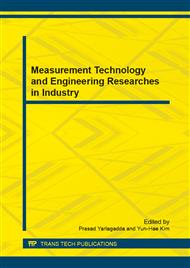[1]
C. Dick and F. Harris, FPGA implementation of an OFDM PHY, in Proc. Conf Signals, Systems and Computers Record of the Thirty-Seventh Asilomar Conf, vol. 1, 2003, p.905–909.
DOI: 10.1109/acssc.2003.1292045
Google Scholar
[2]
Y. Tang, L. Qian, and Y. Wang, Optimized software implementation of a full-rate IEEE 802. 11a compliant digital baseband transmitter on a digital signal processor, " in Proc. IEEE GLOBECOM , 05, vol. 4, (2005).
DOI: 10.1109/glocom.2005.1578053
Google Scholar
[3]
M. Abdelall, A. F. Shalash, and H. A. H. Fahmy, A reconfigurable baseband processor for wireless OFDM synchronization sub-system, in Proc. IEEE Int Circuits and Systems (ISCAS) Symp, 2011, p.2385–2388.
DOI: 10.1109/iscas.2011.5938083
Google Scholar
[4]
A. Marwanto, M. A. Sarijari, N. Fisal, S. K. S. Yusof, and R. A. Rashid, Experimental study of OFDM implementation utilizing GNU radio and USRP-SDR, in Proc. IEEE 9th Malaysia Int Communications Conf., 2009, p.132–135.
DOI: 10.1109/micc.2009.5431480
Google Scholar
[5]
P. Schniter, Low-complexity equalization of OFDM in doubly selective channels, IEEE T. Signal. Proces., vol. 52, no. 4, p.1002–1011, (2004).
DOI: 10.1109/tsp.2004.823503
Google Scholar
[6]
Z. Tang, R. C. Cannizzaro, G. Leus, and P. Banelli, Pilot-assisted time-varying channel estimation for OFDM systems, IEEE T. Signal. Proces., vol. 55, no. 5, p.2226–2238, (2007).
DOI: 10.1109/tsp.2007.893198
Google Scholar
[7]
L. Rugini, P. Banelli, and G. Leus, Simple equalization of time-varying channels for OFDM, IEEE Commun. Lett., vol. 9, no. 7, p.619–621, (2005).
DOI: 10.1109/lcomm.2005.1461683
Google Scholar
[8]
T. Xu, H. Lu, Z. Tang, and R. van Leuken, "Memory and Computation Reduction for Least-Square Channel Estimation of Mobile OFDM Systems. In Proc. IEEE International Symposium on Circuits and Systems (ISCAS), pages 3556–3559, Seoul, Korea, (2012).
DOI: 10.1109/iscas.2012.6271466
Google Scholar
[9]
G. H. Golub and C. F. Van Loan, Matrix Computations, 3rd ed. Johns Hopkins Univ. Press, (1996).
Google Scholar
[10]
E. -J. Im, Optimizing the perfomance of sparse matrix-vector multiplication, Ph.D. dissertation, University of California Berkeley, May (2000).
Google Scholar
[11]
A. Takach, B. Bowyer, and T. Bollaert, C based hardware design for wireless applications, in Proc. of the conference on Design, Automation and Test in Europe, 2005, p.124–129.
DOI: 10.1109/date.2005.87
Google Scholar


